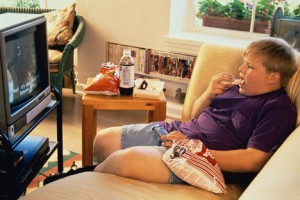The Sedentary Life
An article from Time by staff writer Alice Park focuses on the physical health effects of kids’ television viewing. The article summarizes the findings of researchers from the US and Spain who studied inactivity in 111 children ranging from 3 to 8 years old. The researchers found that of television, Internet and video games, television is the worst for kids. They found that kids who watch excessive television are more likely to have higher blood pressure, even if they’re at a healthy weight.
What makes television worse than other sedentary activities? The findings suggest that kids watching television are likely to be eating unhealthy snacks, which could explain the rise in blood pressure. They also note that watching television right before bed stimulates kids’ minds and keeps them up. This lack of sleep affects metabolism and can cause weight gain.
While the main concerns of parents about television in the 1950s was the morality and emotional effects of television, rather than its physical effects. Family values were also central to television rhetoric. “In advice literature of the period, mass media became a central focus of concern as experts told parents how to control and regulate media in ways that promoted family values,” writes Spigel in “Seducing the Innocent.” Spigel and modern parents have similar concerns, however, when it comes to turning off the tube. Concern for kids with the “telebugeye” came about along with concerns for kids “habits of hygiene, nutrition and decorum” (p. 147). Parents have feared the effects on kids’ television-viewing habits since television’s invention, but now they have there is evidence of how detrimental “vegging out” in front of the TV can be.
For a post on the same article, please see Mira’s blog post.

